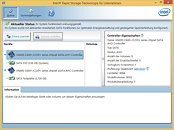Thursday, December 11th 2014

Intel Facing HEDT Chipset Troubles, Again?
In what is a repeat of the design issues Intel faced with its previous X79 Express chipset, over its integrated storage controller, leading to motherboard vendors redesigning their products with fewer SATA/SAS ports than the platform is capable of, the company is facing design troubles with its already-launched X99 Express chipset, which drives its latest Core i7-5xxx "Haswell-E" HEDT platform. Intel X99 Express is based on a common silicon, on which the company's enterprise C610 chipset is also based. On paper, it features as many as ten SATA 6 Gb/s ports. The storage controller has its own exclusive Rapid Storage Technology driver, marked "RSTe" on Intel's Download website.
Intel withdrew version 4.1.0.1046 of its RSTe drivers (even from the list of older drivers), and made its motherboard partners do the same. Replying to German publication Heise.de, ASUS explained that the driver was withdrawn because it doesn't support ATA TRIM command for SSDs striped in a RAID 0 array. The latest driver makes only six out of ten SATA 6 Gb/s ports visible to the operating system, and you can create RAID arrays using on these six ports. The other four ports become visible as part of a separate controller, only when a device is plugged into them. This controller is recognized by Windows' internal Standard AHCI controller driver. This also means that the four ports don't benefit from the SATA power management features the first six ports do, nor can they be part of a RAID array with drives plugged to the first six ports. Intel did not respond to the Heise article.
Source:
Heise.de
Intel withdrew version 4.1.0.1046 of its RSTe drivers (even from the list of older drivers), and made its motherboard partners do the same. Replying to German publication Heise.de, ASUS explained that the driver was withdrawn because it doesn't support ATA TRIM command for SSDs striped in a RAID 0 array. The latest driver makes only six out of ten SATA 6 Gb/s ports visible to the operating system, and you can create RAID arrays using on these six ports. The other four ports become visible as part of a separate controller, only when a device is plugged into them. This controller is recognized by Windows' internal Standard AHCI controller driver. This also means that the four ports don't benefit from the SATA power management features the first six ports do, nor can they be part of a RAID array with drives plugged to the first six ports. Intel did not respond to the Heise article.

30 Comments on Intel Facing HEDT Chipset Troubles, Again?
:twitch:
(I only have 4) :D
Completely new RAM (Read: insanely high pricing and no real selection), combined with a new motherboard, leads me to question whether upgrading is worth it.
I've made peace with X79 delivering way less SATA connectivity than initially suggested. I see little reason that X99 is a necessary upgrade right now. Maybe Skylake will deliver on promises, but I don't see why I should care right now.
As to people calmly accepting Intel failures, while railing against AMD, I don't understand. Who exactly is still angry with AMD? After the bulldozer mistake, AMD has been behind Intel at every turn (with the exception of ATI providing a decent GPU for APUs). Intel products perform better, but cost more. We've accepted that, and if you don't I'd ask what rock you've been living under for the past decade?
If you personally don't accept it, then buy only AMD processors. You'll quickly note high-end Intel costs double that of high-end AMD. We've accepted it, because them charging that much actually has been accepted.